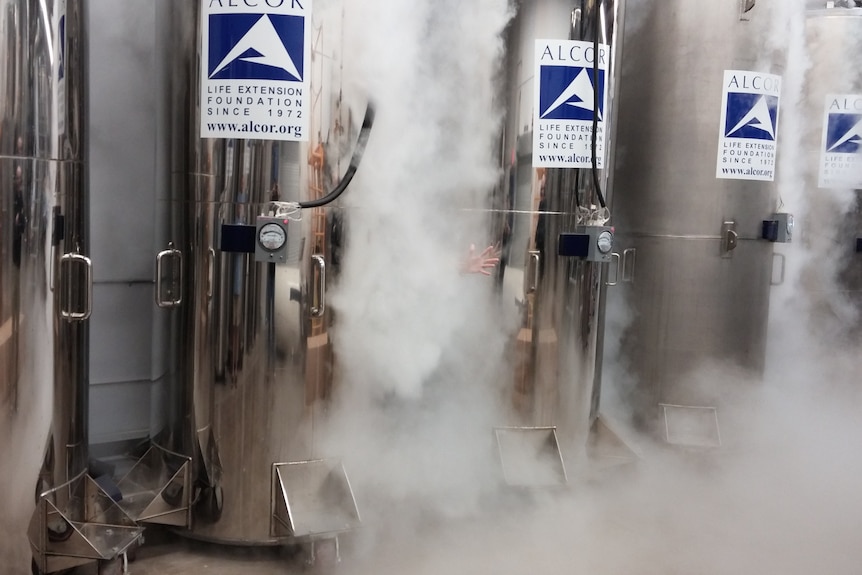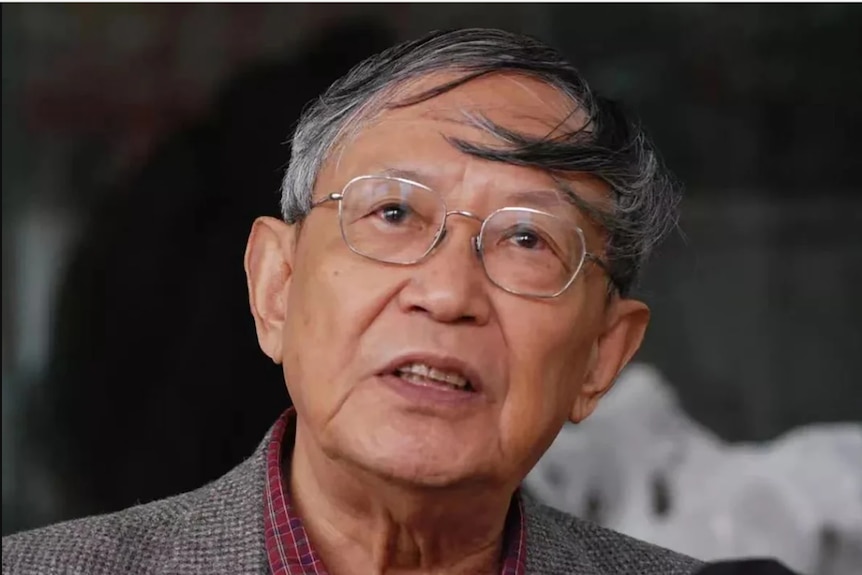AVOID POWER FAILURE
What's philosophy got to do with cryonics?
Li was a leading light of the Chinese aesthetics movement in the 1980s, whose ideas navigated the philosophies of Confucianism, Marxism, and the European Enlightenment

Learning how to freeze a body has been one challenge, but scientists are still yet to figure out how to thaw bodies without damaging them.(Supplied: Alcor Life Extension Foundation)
At Alcor, the process begins with paperwork, which provides legal guarantees, and a payment to "crowd-fund" the science of cryonics.
"Most people use life insurance, and if you do it properly, it's about the cost of a funeral," Mr Arrowood said.
Cryonics facility opens in Australia
Philip Rhoades wants to be among the first frozen in NSW.
Then when a person dies or is about to die, a specialist team is dispatched to their location.
Once a patient is legally dead, their blood is drained and replaced with an organ preservation solution.
The body is then transported to Alcor's facilities and gradually cooled to minus 196 degrees Celsius over the course of a week.
It is then stored in a vacuum-sealed chamber cooled by liquid nitrogen.
The final step, revival, is still a work in progress.
Is it possible to find life after death?
Some animals have a freeze tolerance — the Rana Sylvatica frog, for example, freezes during winter and hops out in the spring.
But humans are incredibly complex and scientists are yet to figure out how to thaw bodies without damaging tissue and organs.

Rana Sylvatica, or wood frogs, are capable of freezing during the winter and thawing out in spring without any damage to their bodies. (Reuters: Nikola Solic)
Mr Arrowood is painfully aware his field is often plagued by evangelical commercial operators promising life after death but he said Alcor was a not-for-profit research organisation that did not promise "immortality".
"There is a small group of members that think that we will imminently be revived," he said.
"But Alcor is not a philosophical organisation. We're not a religion. We are a science lab."
Mr Arrowood said most members joined because they wanted be part of the "Apollo moon landing of biology".
"Even if it doesn't work for them, if they contribute it could work for their grandchildren or somebody in the future," he said.
"And if it never works at all for the brain, it very likely will work for the kidneys or other organs."
But RMIT Centre for Molecular and Nanoscale Physics director Gary Bryant was highly doubtful the technology would work.
"From a scientific viewpoint there is no chance that any bodies frozen using current technologies will be able to be brought back to life," he said.
Does culture leave a mark on the brain?
Li wanted to be studied, not revived, but even if his brain remained preserved for hundreds of years it may not be enough to prove his ji dian theory.
University of Melbourne associate professor of anatomy Jenny Gunnersen said certain experiences such as drinking alcohol do leave a mark on the brain but it's much harder to observe the impact of society.
Li Zehou wanted his brain frozen for a few hundred years, then studied.
In the field of cryogenics, freezing a body is easy, but thawing one back out remains a challenge.(Supplied: Alcor Life Extension Foundation)
In an unassuming facility in the desert city of Pheonix, Arizona, hundreds of frozen bodies are held in cryogenic chambers.
We don't know who exactly has entrusted their remains to the Alcor Life Extension Foundation.
But we do know the identity of at least one of the 227 'patients': Chinese philosopher Li Zehou.
So how did one of China's most revered intellectuals, a man dedicated to semantics — not science-fiction — get immersed in the high-tech world of cryonics?
For Li, it had everything to do with philosophy.
In an unassuming facility in the desert city of Pheonix, Arizona, hundreds of frozen bodies are held in cryogenic chambers.
We don't know who exactly has entrusted their remains to the Alcor Life Extension Foundation.
But we do know the identity of at least one of the 227 'patients': Chinese philosopher Li Zehou.
So how did one of China's most revered intellectuals, a man dedicated to semantics — not science-fiction — get immersed in the high-tech world of cryonics?
For Li, it had everything to do with philosophy.
What's philosophy got to do with cryonics?
Li was a leading light of the Chinese aesthetics movement in the 1980s, whose ideas navigated the philosophies of Confucianism, Marxism, and the European Enlightenment
.
Li Zehou left China for the US in the wake of the 1989 pro-democracy demonstrations. (Supplied)
ANU Chinese history lecturer Matthew Galway said he appealed across intellectual circles "because of his ability to write in such a way that was provocative, yet fascinating and broadly accessible".
"As the great sinologist Yu Ying-shih once said, his ideas in his written works rescued a generation of intellectuals and independent minds from the tyranny of cultural revolutionary Mao," Dr Galway said.
Li left China for the US in the wake of the 1989 pro-democracy demonstrations and, according to the South China Morning Post, he revealed plans to "freeze his brain" in 2010.
"Take it out after 300 or 500 years," he told the Southern People Weekly.
"I am trying to prove whether culture affects the brain, and whether it is possible to find remnants of Chinese culture in my brain after a few hundred years."
This is known as Li's ji dian theory.
When Li died in 2021, he wasn't the first big thinker to end up at Alcor.
How does it work?
Co-CEO James Arrowood said "some of the smartest" and "most prominent" people in the world had signed up to have their bodies or heads preserved after death.
But most names are kept secret.
Li Zehou left China for the US in the wake of the 1989 pro-democracy demonstrations. (Supplied)
ANU Chinese history lecturer Matthew Galway said he appealed across intellectual circles "because of his ability to write in such a way that was provocative, yet fascinating and broadly accessible".
"As the great sinologist Yu Ying-shih once said, his ideas in his written works rescued a generation of intellectuals and independent minds from the tyranny of cultural revolutionary Mao," Dr Galway said.
Li left China for the US in the wake of the 1989 pro-democracy demonstrations and, according to the South China Morning Post, he revealed plans to "freeze his brain" in 2010.
"Take it out after 300 or 500 years," he told the Southern People Weekly.
"I am trying to prove whether culture affects the brain, and whether it is possible to find remnants of Chinese culture in my brain after a few hundred years."
This is known as Li's ji dian theory.
When Li died in 2021, he wasn't the first big thinker to end up at Alcor.
How does it work?
Co-CEO James Arrowood said "some of the smartest" and "most prominent" people in the world had signed up to have their bodies or heads preserved after death.
But most names are kept secret.
Learning how to freeze a body has been one challenge, but scientists are still yet to figure out how to thaw bodies without damaging them.(Supplied: Alcor Life Extension Foundation)
At Alcor, the process begins with paperwork, which provides legal guarantees, and a payment to "crowd-fund" the science of cryonics.
"Most people use life insurance, and if you do it properly, it's about the cost of a funeral," Mr Arrowood said.
Cryonics facility opens in Australia
Philip Rhoades wants to be among the first frozen in NSW.
Then when a person dies or is about to die, a specialist team is dispatched to their location.
Once a patient is legally dead, their blood is drained and replaced with an organ preservation solution.
The body is then transported to Alcor's facilities and gradually cooled to minus 196 degrees Celsius over the course of a week.
It is then stored in a vacuum-sealed chamber cooled by liquid nitrogen.
The final step, revival, is still a work in progress.
Is it possible to find life after death?
Some animals have a freeze tolerance — the Rana Sylvatica frog, for example, freezes during winter and hops out in the spring.
But humans are incredibly complex and scientists are yet to figure out how to thaw bodies without damaging tissue and organs.
Rana Sylvatica, or wood frogs, are capable of freezing during the winter and thawing out in spring without any damage to their bodies. (Reuters: Nikola Solic)
Mr Arrowood is painfully aware his field is often plagued by evangelical commercial operators promising life after death but he said Alcor was a not-for-profit research organisation that did not promise "immortality".
"There is a small group of members that think that we will imminently be revived," he said.
"But Alcor is not a philosophical organisation. We're not a religion. We are a science lab."
Mr Arrowood said most members joined because they wanted be part of the "Apollo moon landing of biology".
"Even if it doesn't work for them, if they contribute it could work for their grandchildren or somebody in the future," he said.
"And if it never works at all for the brain, it very likely will work for the kidneys or other organs."
But RMIT Centre for Molecular and Nanoscale Physics director Gary Bryant was highly doubtful the technology would work.
"From a scientific viewpoint there is no chance that any bodies frozen using current technologies will be able to be brought back to life," he said.
Does culture leave a mark on the brain?
Li wanted to be studied, not revived, but even if his brain remained preserved for hundreds of years it may not be enough to prove his ji dian theory.
University of Melbourne associate professor of anatomy Jenny Gunnersen said certain experiences such as drinking alcohol do leave a mark on the brain but it's much harder to observe the impact of society.
Li Zehou wanted his brain frozen for a few hundred years, then studied.
(Submitted: Alcor Life Extension Foundation)
"Life and society influences our brain a lot through the environmental inputs that we have. But collectively, it would not be necessarily true to say that being in one particular country or city would be distinguishable when you look at an intact brain after someone's died," she said.
"And then to actually draw conclusions … to test a hypothesis, we need to have a large number of brains all treated the same way."
While there are many unanswered questions in the science of cryogenics and the philosophy of Li, Mr Arrowood said Alcor was "deeply honoured" to be the custodian of a man of his cultural and philosophical standing.
"His philosophy was that you could both be an individual and embrace individual rights, but at the same time, you ought to be contributing to the common good," he said.
"His donation of his mind is a fantastic donation because we have this incredible brain of a great thinker of our time that we get to preserve, and we get to study."
Posted 3h ago
"Life and society influences our brain a lot through the environmental inputs that we have. But collectively, it would not be necessarily true to say that being in one particular country or city would be distinguishable when you look at an intact brain after someone's died," she said.
"And then to actually draw conclusions … to test a hypothesis, we need to have a large number of brains all treated the same way."
While there are many unanswered questions in the science of cryogenics and the philosophy of Li, Mr Arrowood said Alcor was "deeply honoured" to be the custodian of a man of his cultural and philosophical standing.
"His philosophy was that you could both be an individual and embrace individual rights, but at the same time, you ought to be contributing to the common good," he said.
"His donation of his mind is a fantastic donation because we have this incredible brain of a great thinker of our time that we get to preserve, and we get to study."
Posted 3h ago
No comments:
Post a Comment